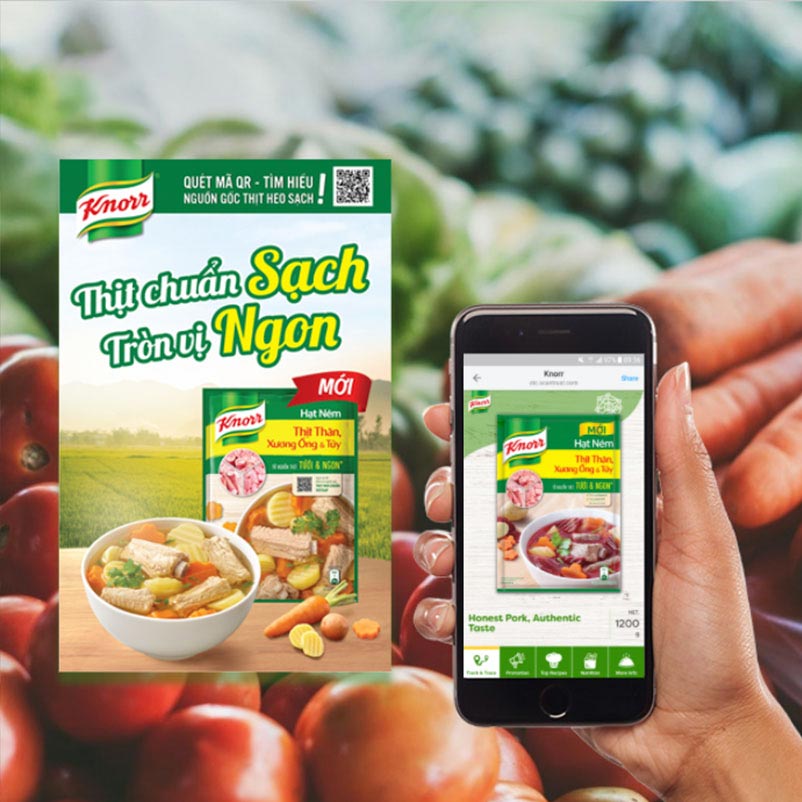Knorr is Unilever’s sustainable living food brand and a market leader for pork seasoning worldwide. To address competitive challenges in Vietnam, Knorr planned to differentiate themselves from the competition with well-supported claims of a superior product with premium ingredients. Research has proven there is a strong association linking quality to flavor and taste. That made the plan clear: Knorr’s use of premium pork shinbone, tenderloin, and marrow had to be tied to being sourced from the highest quality pork farms. By confirming the origins of the ingredients in their pork seasoning products with a food traceability scheme, Knorr was able to give weight to their superior product claims.
Food traceability solutions: how Unilever set up traceability of food to improve their market position
Knorr needed their customers to see their product's superior ingredients as the Knorr unique selling proposition.

Summary
Scantrust used serialized, unique QR codes to set up a food traceability solution for every seasoning packet. Each code would be a gateway to online product information, including farm-to-fork ingredient origin details. A blockchain connector was also implemented to maximize support for claims assuring superb ingredient quality. Knorr rolled out the changes with a marketing campaign, including updated packaging artwork and TV spots.
Sales among the targeted segment improved soon after the project launch, and scans of the QR codes continued to provide Knorr with new insight into their customers’ preferences well after the products had left grocery stores.
Knorr foods
Knorr is a German food and beverage brand owned by British-Dutch fast-moving consumer goods company Unilever. The Knorr product range includes dehydrated soup and meal mixes, bouillon cubes, and condiments. The brand has invested significant resources in sustainable sourcing commitments and producing high-quality food products. They needed a way to communicate this unique selling proposition and tell their story in response to growing competition in crucial regions. Scantrust is a connected goods platform for companies that depend on selling physical products and require solutions to just these types of challenges. Using Scantrust secured QR codes and a blockchain connector solution for storage, Knorr had an ideal solution to deliver their story about superior quality pork product ingredients.
Why food traceability?
Knorr has enjoyed market leader status in Vietnam for almost two decades. They attribute this to their commitment in producing from shinbone, tenderloin, and marrow that is carefully selected from clean pork farms. Despite this, they started to see their market position erode in a key regions. Research revealed that the motivating factor was competitors’ lower price point. The competition was highlighting the exact same ingredients that Knorr emphasized in their product, despite using cheaper ingredient options. If lower prices continued appealing to consumers, preference for cheaper options could become a bigger trend. Knorr recognized the need to take action and redoubled efforts to differentiate themselves and their product. Surveys confirmed that the quality of pork meat ingredients was still important to purchase decisions and that consumers associated superior quality with superior taste. Armed with these findings, Knorr concluded that they would showcase the pig farms that supplied their ingredients using a food traceability scheme. The high standards and commitment to hygiene and quality on the farms would be the supporting differentiator for that superior taste in their pork products and the story could be delivered through connected packaging.
Without this initiative, we would continue to lose market share. The investment is justified by winning back the shares in the targeted areas, and it has been delivering.
Phuong Nham,
Unilever Regional Brand Manager for the Knorr-Scantrust traceability project, SEAA Foods
The Scantrust traceability of food solution
Knorr took a bet on a food traceability solution to deliver their superior quality story. They looked for a vendor among members of the Unilever Foundry program. Scantrust previously presented a digitalization solution as a participant in the foundry program, standing out among the options. Once selected for the tender, Scantrust worked with Unilever packaging and printing suppliers in Vietnam to print the needed QR codes in a two-phase process. Offset presses were used to print the uniform Knorr packets, leaving blank space for the unique codes. Next, a digital printer added the unique codes to the available packaging design area on each product packet. To bring millions of codes online, scanning cameras were installed onto packing lines for automated inline activation of the product codes as the products left the factory. Data generated and bound to the products include the name and location of the originating farm, the type of meat used, the butchering date, and details from the meat processing plant such as receiving date, processing date, and mixing ingredients. These are accessed by consumers when they scan the products.
Results of establishing food traceability
Knorr connected packaging QR codes were introduced to the market through TV commercials and other media channels, including a call to action encouraging consumers to scan the “clean pork farm” sourced products. Results came quickly: sales in the region turned in favor of Knorr soon after the project launched, justifying an investment in planning and setting up a pioneering use of blockchain with serialized QR codes.
Putting transparency for consumers as a top priority continues to deliver Knorr’s premium product narrative and price point versus the competition. Further, they’ve shown that this is a way to develop consumer trust – an especially strong sentiment for food producers. Scan interactions continue to be gathered in the Scantrust connected goods platform and are available in real-time and on-demand to the Knorr team through our business intelligence dashboard. Knorr Vietnam now has a live stream of data that informs their sales and marketing teams, and everyone is pleased with ultimately having a strategy against aggressive competitor pricing.
Your company can get more from its products and packaging with Scantrust connected packaging. You can learn more or schedule a demonstration. Click the link below.